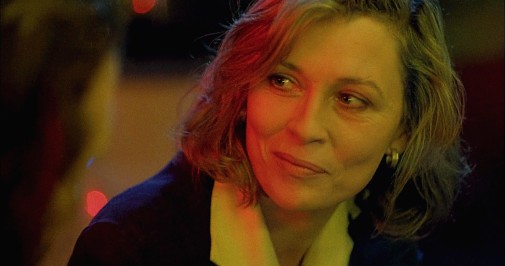
I confess myself surprised by the reader's choice in this last round of voting for the Almost There series. When it came time for you to select what 1987 performance should be explored this week, your votes decidedly indicate a preference for Faye Dunaway's post-Mommie Dearest Oscar bid, Barfly. This under-discussed Barbet Schroeder flick was made from a semiautobiographical script by the bonafide poet of the gutter, Charles Bukowski. It competed in Cannes but it didn't cause much fanfare, mainly valued as an acting showcase for its cast, led by Mickey Rourke as a tic-ridden sing-songy facsimile of Bukowski himself.
As for Faye Dunaway, she takes around 22 minutes to enter this picture about alcoholism and the addicts who scuttle from the light like bugs. Haggard-looking and sitting lonesome at the end of a bar, she's quite distant from the image of a glamourous diva many might associate with the actress' screen persona…
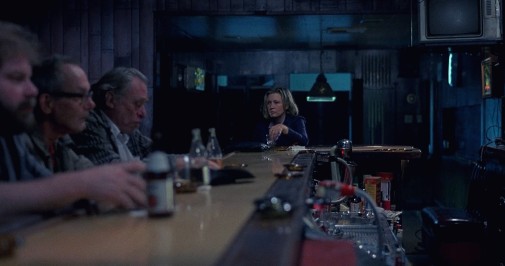
Rourke's Henry Chinaski has just been kicked out of his usual haunt after another fight with the bartender. Though victorious, he's thoroughly beaten and in need of some boozy refreshment. Thirst and despair drag his destitute self to another establishment and there he finds Wanda. Up until then, Barfly's been dominated by piss-yellow luminescence and shadows in shades of viridian vomit, but Robby Müller lights the woman in cold azure-ish grey. She looks like a grimy ghost or perhaps a cadaver holding itself upright by some ungodly force.
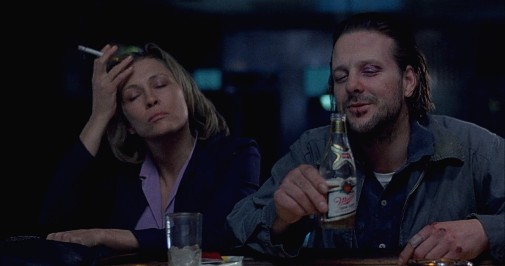
Immediately, Dunaway's a harbinger of formal variation, a ball of negative energy that reflects and complements Rourke's drunken poet. When Henry gets closer, the first words out of her mouth are a proclamation of dislike for everyone else in the world. "I can't stand people. I hate them." – a line Dunaway utters with world-weary exhaustion before going off on a somnambulistic appreciation of Rourke's battered visage. Wanda thinks his beat-up face looks beautiful and she's not even kidding. Someone who lives at the bottom of the barrel learns to find beauty in the sludgy darkness they call home.
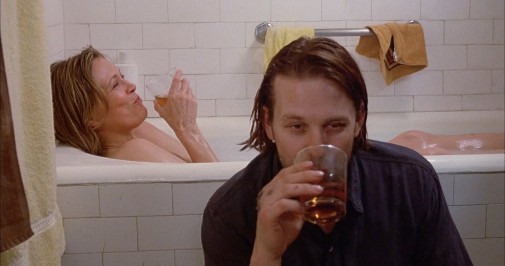
Bukowski's unique sense of humor is well handled by Dunaway whose commitment to the film's challenges both impresses and beguiles. She does very little in this first scene, corpse-like as she is, but we can't help but be drawn to her faded magnetism. Maybe it's some ineffable aura the diva possesses, or maybe it's the stark contrast between Dunaway and Rourke. The latter often looks like there's an entirely different drama going on inside his head, something he's unable to fully articulate for the camera and the audience. This is both fascinating and frustrating, more rewarding for the performer than for the audience. Dunaway couldn't be more different.
If he's an insular presence, she's a sprawling ocean whose transparent waves dazzle and frighten before they crash above us and drown with smothering sorrow. Hers is an immersive, faintly cerebral, performance that invites the spectator to come closer, to come inside her character's head. Furthermore, there's always a sense that Wanda isn't fully living in the moment, part of her stuck in perpetual reminiscence of what she once was. Dunaway makes this clear, giving enough behavioral minutia for us to understand who this woman might have been outside the cloud of addiction.
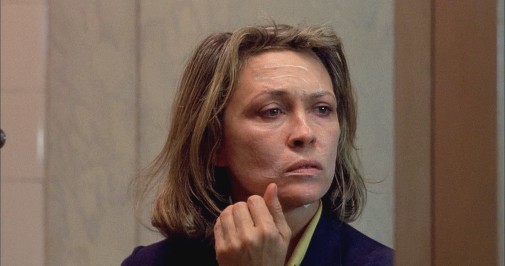
Dunaway lets us feel Wanda's history even if the script rarely alludes to it, playing the role of someone at the end of a long sad tale that's happened offscreen. You see it in the slivers of bruised vanity, her unexpected glee, the way she savors some occasional witty line. This is further emphasized by Dunaway's particularities as a performer. The Oscar-winning star of Bonnie and Clyde has never been an effortless actress, one that hides their craft through veils of fake casualness. Instead, she makes sure we're aware of her acting, every deliberate tension of the face preluded by a suspenseful breath or the turn of the head towards the light.
This can be tiresome, but it can also be sublime. It all depends on the role and the film. Barfly's a rambling tale, a half-remembered nightmare, perhaps the incoherent ramblings of the drunkard who blesses a bar's patrons with garbled storytelling. It's a cynical game of observation, drawing wry conclusions from a theatre of the intoxicated. Regarding Wanda, she's rather sublime in her pitiful way, a woman whose soul has been fermenting in cheap liquor for the past decade or so. The specificities of movie and character thus make for a great canvas unto which Dunaway's exacting showmanship can flourish and paint an impressive picture.
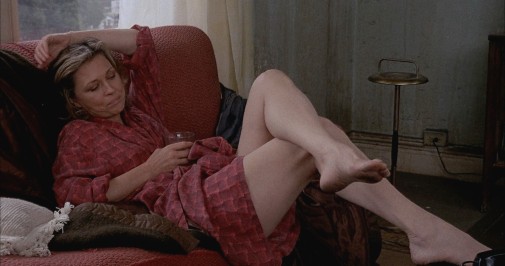
Whenever the actress' choices feel a bit too deliberate, it reads as if Wanda is rehearsing what to say, tirelessly trying to maneuver the nebula of drunkenness to sick out semi-intelligible words. Her internal machinations come off as a woman's desperate struggle to still be herself through the anesthesia of alcohol. Regard, too, the way she rearranges her body in the morning light once she notices Henry noticing her. It's a self-conscious dance, a clumsy reinterpretation of provocative sensuality. Wanda looks and acts like a faded beauty, a once blinding star that's lost its light. The ghost of her shine torments her and it torments us, who watch her, as well.
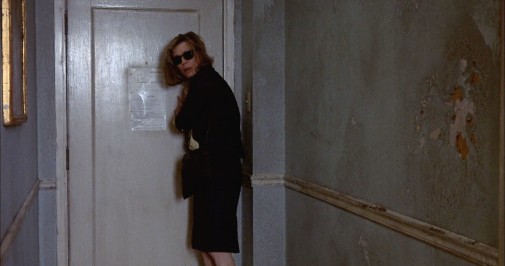
To be honest, this is a performance full of great details that call for verbose analysis. I'm thinking of how she says she doesn't want to fall in love, not again. The line, as written, is a vague whisper, unsubstantial in information but suggestively wistful. Dunaway's the one who adds a prismatic rainbow of color to the words. She shades them with the echoes of old emotions. Later, in the same scene, when she bites down on purloined ears of green corn, it's as if Wanda's feelings are a mountain of old pains crashing down. Nothing ever works for this woman and the inedible maize is that unexpected drop that makes the glass overflow. Misery cascades down her face, her downturned mouth, and empty eyes.
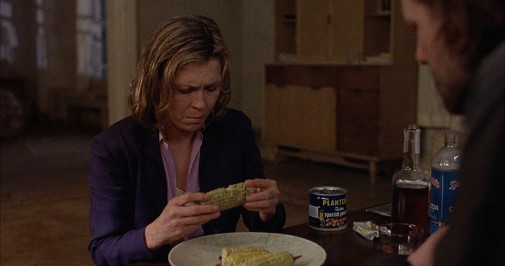
All in all, like many of Dunaway's most controversial works, this star turn is almost frightening in its intensity. Nothing better represents this than the way she manages to barrel through the script's more dubious decisions, killing any hint of maudlin excess with a spike of meanness, and finding truth in the labored dialogue. When Wanda speaks of an Angel of Death coming to take her, for example, the thespian forces the sudden lyricism to sound genuine, a burst of oneiric derangement onset by a crumbling mind. Near the end, Faye Dunaway even manages to redeem a ridiculous catfight with her sheer ferociousness. It's astounding to behold.
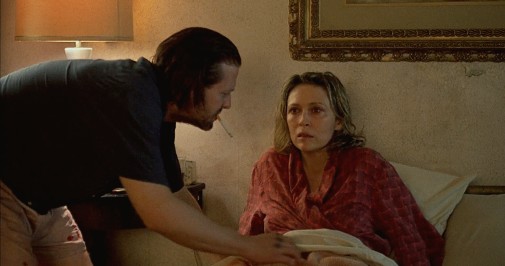
While it's a smidge difficult to imagine AMPAS going for such a puke-stained antidramatic chronicle of alcoholism and grubby humanity, stranger things have happened. Dunaway got as far as getting a Golden Globe nomination for Best Actress but failed to make it into the Academy's nominated quintet. Instead, the honored performers were Glenn Close in Fatal Attraction, Holly Hunter in Broadcast News, Sally Kirkland in Anna, Meryl Streep in Ironweed, and, of course, the victorious Cher in Moonstruck. It's interesting to consider that Streep's nominated character is rather like Dunaway's Wanda, both women cursed by the need for booze and drowning in despondence.
Another thing both performances have in common is their dubious categorization. While Ironweed and Barfly were viewed as two-protagonist stories by awards bodies, their narratives are dominated by Jack Nicholson and Mickey Rourke respectively. Streep and Dunaway have big roles, but they're arguably secondary, always supporting, complementing the men's story and themes. Like many a star, Dunaway would have probably refused a supporting campaign at the time, but it's fun to speculate how that lineup would have looked with her in it.
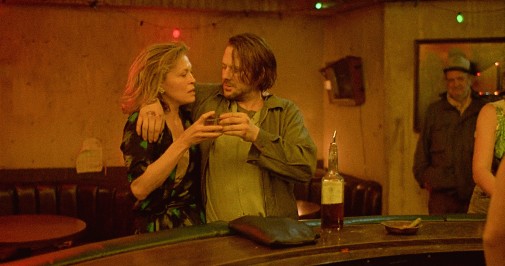
Would you have nominated Dunaway in 1987? If so, under which category would you honor her haunting performance in Barfly?